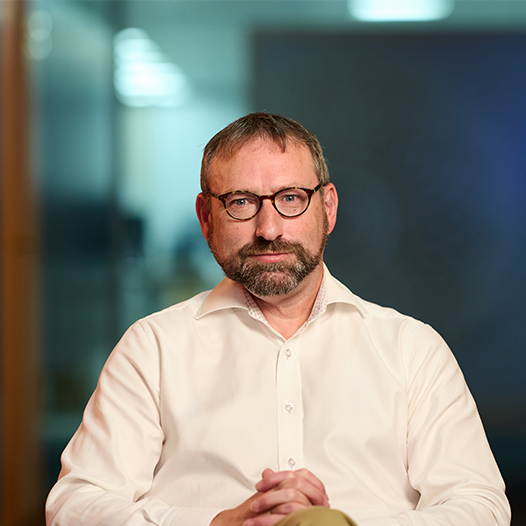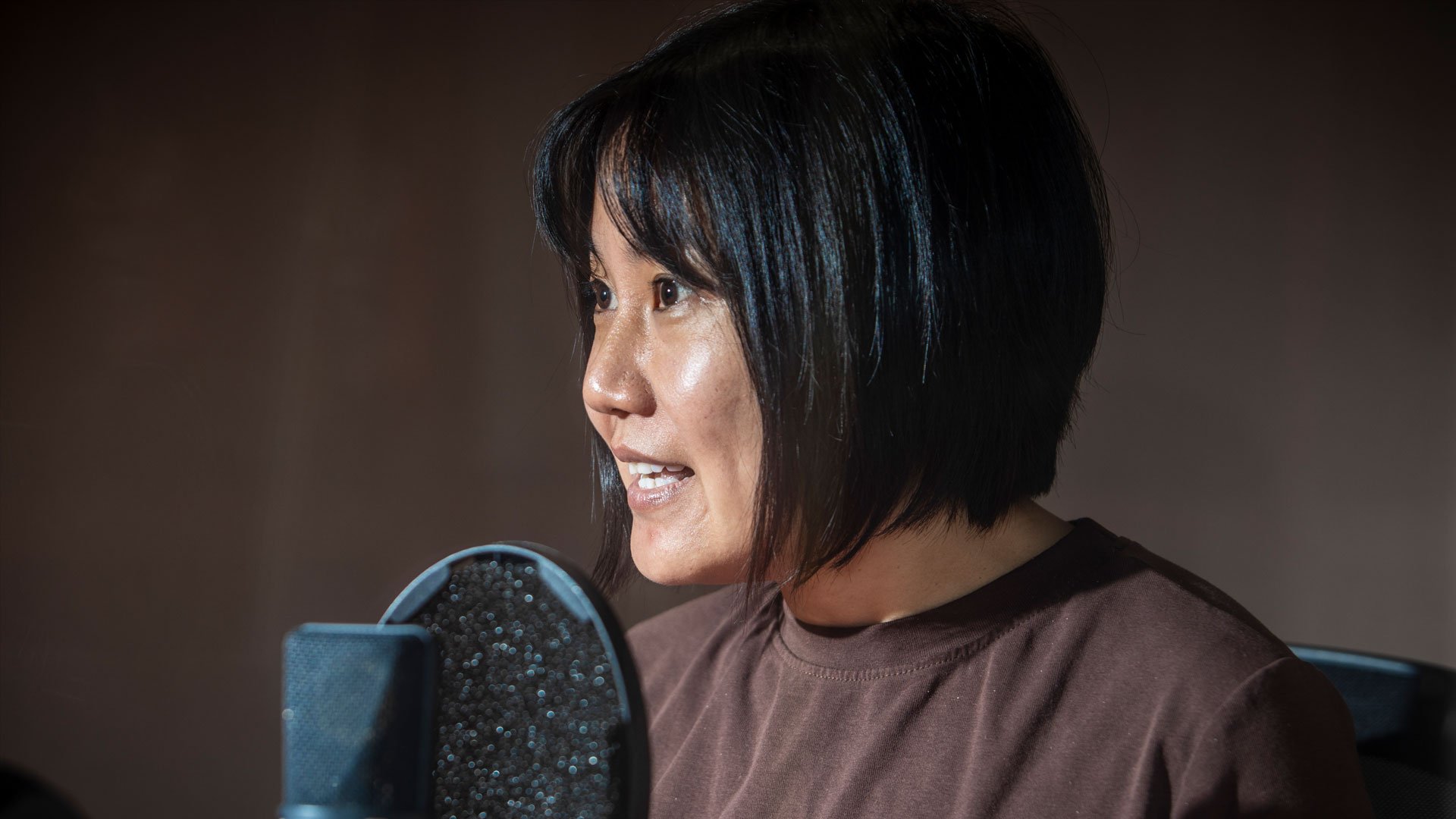Key points
- Recognising what has to change helps us to spot investable, long-term growth opportunities
- These include the development of smarter robots, the application of artificial intelligence to drug discovery and spending on infrastructure that supports the energy transition
- This investment approach requires optimism and patience
Listen to the podcast on Spotify and Apple Podcasts
Capital at risk
The future is uncertain, but that doesn’t make it unknowable.
One way to find great growth companies is to identify developments that are bound to occur, even if you can’t be certain of every exact detail or timing.
“We try to think about what has to change,” partner Stuart Dunbar tells our Short Briefings on Long Term Thinking podcast.
“Things that don’t depend on the government of the day or short-term economic policies or interest rates, but rather what inevitably will happen over the next 10 years.”
Smarter, agile robots
Dunbar gives the use of smarter, more capable robotics as an example, suggesting that the ageing populations of many developed economies make the technology’s development and adoption imperative.
“We’re seeing a decline in the number of working-age people,” he explains. “And since labour shortages drive up wages, we’ll need to find ways to automate everything we can.”
Machines are many years, if not decades, away from matching humans at every manual task. But there are already signs of their potential, whether it’s Deere & Co’s self-driving tractors and precision spraying equipment or the multitude of robots ferrying goods around Amazon and Coupang’s ecommerce warehouses.

Coupang uses robots to move and sort packages in some of its South Korean warehouses
© Coupang. Coupang’s trademarks are used under license from Coupang, LLC or its affiliates.
NVIDIA, among others, predicts a wave of ‘physical AI’, in which the large language model (LLM) systems that supercharged chatbots next deliver ‘intelligent machines’ capable of tackling ‘real world’ complexities. That would further drive demand for advanced semiconductors. But this is not the only supply chain opportunity.
“Take Renishaw – one of the great British companies,” Dunbar says. “It builds its own machinery with sophisticated sensors, and more often, its sensors are attached to others’ products to translate the physical world into a digital format so that robots can be aware of their surroundings.
“We know there will be huge demand for such components even if it’s not clear how the robots will end up being used.”
Innovative healthcare
Dunbar highlights “intelligent design” of new medicines as a second inevitable, investable theme. Mass gene sequencing and cloud computing services combined with machine learning are giving researchers a more informed understanding of how drugs work.
“Companies like Illumina radically reduced the cost of gene-sequencing, creating large data sets that are almost unfathomably huge,” Dunbar explains.
“Now, AI is starting to mine that data for meaningful relationships. A good example is Recursion Pharmaceuticals. It’s doing millions of tests to identify new drugs for previously untreatable conditions.”
That has the potential to speed up drug discovery and reduce its cost.
“Any reasonable assessment of the ever-rising spend on healthcare dictates that at some point it becomes unaffordable,” Dunbar says. “That creates a drive for less expensive, more effective treatments.
“It’s hard because the companies developing new therapies face funding pressure themselves. But it must happen or there will be a tipping point where treatments become unavailable because they’re too costly.”
Energy transition
The shift to renewable energy and electrification of transport is the third unstoppable growth driver discussed. Fossil fuels and nuclear fission still have the advantage of providing reliable power, whatever the weather. But Dunbar suggests intermittency issues will be addressed.
“It’s cheaper to create electricity through solar and wind, the problem is that we can’t yet store it. But there are companies out there doing amazing things to address that.
“For example, the Chinese firm CATL is probably the most advanced battery maker. And in the US, Redwood Materials is working hard to create critical battery components from recycled and reclaimed scrap.”
He also highlights the excellent growth potential of lesser-known names, Prysmian and Nexans. Their extra-high-voltage submarine and underground cables connect offshore wind farms to the mainland. Both are also developing ‘smart grid’ solutions to make power management more flexible.
“Enphase is another favourite of ours,” Dunbar adds. “It makes and fits solar power systems to homes and businesses in the US. It’s a very local business, obviously, but is playing a vital role in creating this distributed grid, which couldn’t have existed 10 years ago.”
Payment systems
Just as the energy transition is driving demand for new physical infrastructure, commerce is doing the same for its digital equivalent. Dunbar has little doubt our dependence on the financial plumbing behind cashless transactions will only grow over the coming years.
“The Dutch payments company Adyen exists in the background and few people stop to think how important it has become,” he offers as an example. “But it’s what allows Netflix, Booking.com, McDonald’s and many others to take payments in different parts of the world and multiple currencies and then seamlessly transfer them where they need to be.”
He adds that consumer-focused fintechs with superior service and lower fees to industry incumbents should also prosper over the decade ahead. Baillie Gifford’s exposure includes the fast-growing Brazil-based online lender Nubank and the international money transfer services Wise and Remitly.
“I always think it’s funny when traditional banks talk about providing commission-free exchanges but charge a 10 per cent spread,” comments Dunbar, referring to the large gap between the exchange rate traditional banks use and that of the true market.
“That’s now up for grabs. Moreover, these apps let you change your currency in the blink of an eye.”
Autonomous transport
The podcast’s final topic is autonomous vehicles. Dunbar acknowledges that self-driving cars have proved to be a more difficult and expensive engineering challenge than many automakers had envisaged, but he says progress is being made elsewhere.

Aurora says its self-driving technology should make goods deliveries more reliable and improve road safety
© Aurora
He cites Aurora Innovation, which plans to launch a driverless trucking service between Dallas and Houston this April. To do so, it is partnering with established lorry makers Volvo and PACCAR and focusing on highway routes rather than more complicated inner-city settings. Given the US freight sector’s longstanding shortage of human drivers, the long-term impact could be transformational.
Drones should also have their day. Zipline, one of Baillie Gifford’s private company investments, made its one-millionth commercial drone delivery in 2024. It has served customers across parts of Africa, Japan and the US, including a tie-up with the retail giant Walmart in Texas.
“It’s not mainstream yet,” Dunbar adds. “You need a huge amount of density – many and frequent deliveries in a given area – to make it a sensible commercial proposition. And there are still regulatory issues to sort out. But these things are not far away.”
It takes “stubborn optimism” and patience to be a long-term growth investor, Dunbar concludes. These transformations will take years to play out. But so long as you believe progress will continue, it’s possible to use the ‘inevitable’ as a guide to achieving strong returns.
“You have to focus on the possibilities, on what’s changing and the great entrepreneurs solving problems and finding ways to do things better,” he says. “That’s how you get growth.”
Subscribe to Short Briefings on Long Term Thinking on Spotify, Apple Podcasts or any other podcast app.
Words by Leo Kelion

Stuart Dunbar, Partner
Stuart is a director in the Clients Department. He joined Baillie Gifford in 2003 and became a partner in the firm in 2014. Stuart is Chair of the UK Business Group as well as coordinating global marketing and product development activity and sitting on various management groups including the firm’s Strategic Leadership Group and ESG Steering Group. He graduated BA in Finance and Business Law from the University of Strathclyde in 1993.
Risk factors
The views expressed should not be considered as advice or a recommendation to buy, sell or hold a particular investment. They reflect opinion and should not be taken as statements of fact nor should any reliance be placed on them when making investment decisions.
This communication was produced and approved in January 2025 and has not been updated subsequently. It represents views held at the time of writing and may not reflect current thinking.
Potential for profit and loss
All investment strategies have the potential for profit and loss, your or your clients’ capital may be at risk. Past performance is not a guide to future returns.
This communication contains information on investments which does not constitute independent research. Accordingly, it is not subject to the protections afforded to independent research, but is classified as advertising under Art 68 of the Financial Services Act (‘FinSA’) and Baillie Gifford and its staff may have dealt in the investments concerned.
All information is sourced from Baillie Gifford & Co and is current unless otherwise stated.
The images used in this communication are for illustrative purposes only.
Important Information
Baillie Gifford & Co and Baillie Gifford & Co Limited are authorised and regulated by the Financial Conduct Authority (FCA). Baillie Gifford & Co Limited is an Authorised Corporate Director of OEICs.
Baillie Gifford Overseas Limited provides investment management and advisory services to non-UK Professional/Institutional clients only. Baillie Gifford Overseas Limited is wholly owned by Baillie Gifford & Co. Baillie Gifford & Co and Baillie Gifford Overseas Limited are authorised and regulated by the FCA in the UK.
Persons resident or domiciled outside the UK should consult with their professional advisers as to whether they require any governmental or other consents in order to enable them to invest, and with their tax advisers for advice relevant to their own particular circumstances.
Financial Intermediaries
This communication is suitable for use of financial intermediaries. Financial intermediaries are solely responsible for any further distribution and Baillie Gifford takes no responsibility for the reliance on this document by any other person who did not receive this document directly from Baillie Gifford.
Europe
Baillie Gifford Investment Management (Europe) Ltd (BGE) is authorised by the Central Bank of Ireland as an AIFM under the AIFM Regulations and as a UCITS management company under the UCITS Regulation. BGE also has regulatory permissions to perform Individual Portfolio Management activities. BGE provides investment management and advisory services to European (excluding UK) segregated clients. BGE has been appointed as UCITS management company to the following UCITS umbrella company; Baillie Gifford Worldwide Funds plc. BGE is a wholly owned subsidiary of Baillie Gifford Overseas Limited, which is wholly owned by Baillie Gifford & Co. Baillie Gifford Overseas Limited and Baillie Gifford & Co are authorised and regulated in the UK by the Financial Conduct Authority.
China
Baillie Gifford Investment Management (Shanghai) Limited 柏基投资管理(上海)有限公司(‘BGIMS’) is wholly owned by Baillie Gifford Overseas Limited and may provide investment research to the Baillie Gifford Group pursuant to applicable laws. BGIMS is incorporated in Shanghai in the People’s Republic of China (‘PRC’) as a wholly foreign-owned limited liability company with a unified social credit code of 91310000MA1FL6KQ30. BGIMS is a registered Private Fund Manager with the Asset Management Association of China (‘AMAC’) and manages private security investment fund in the PRC, with a registration code of P1071226.
Baillie Gifford Overseas Investment Fund Management (Shanghai) Limited
柏基海外投资基金管理(上海)有限公司(‘BGQS’) is a wholly owned subsidiary of BGIMS incorporated in Shanghai as a limited liability company with its unified social credit code of 91310000MA1FL7JFXQ. BGQS is a registered Private Fund Manager with AMAC with a registration code of P1071708. BGQS has been approved by Shanghai Municipal Financial Regulatory Bureau for the Qualified Domestic Limited Partners (QDLP) Pilot Program, under which it may raise funds from PRC investors for making overseas investments.
Hong Kong
Baillie Gifford Asia (Hong Kong) Limited 柏基亞洲(香港)有限公司 is wholly owned by Baillie Gifford Overseas Limited and holds a Type 1 licence from the Securities & Futures Commission of Hong Kong to market and distribute Baillie Gifford’s range of collective investment schemes to professional investors in Hong Kong. Baillie Gifford Asia (Hong Kong) Limited 柏基亞洲(香港)有限公司 can be contacted at Suites 2713-2715, Two International Finance Centre, 8 Finance Street, Central, Hong Kong. Telephone +852 3756 5700.
South Korea
Baillie Gifford Overseas Limited is licensed with the Financial Services Commission in South Korea as a cross border Discretionary Investment Manager and Non-discretionary Investment Adviser.
Japan
Mitsubishi UFJ Baillie Gifford Asset Management Limited (‘MUBGAM’) is a joint venture company between Mitsubishi UFJ Trust & Banking Corporation and Baillie Gifford Overseas Limited. MUBGAM is authorised and regulated by the Financial Conduct Authority.
Australia
Baillie Gifford Overseas Limited (ARBN 118 567 178) is registered as a foreign company under the Corporations Act 2001 (Cth) and holds Foreign Australian Financial Services Licence No 528911. This material is provided to you on the basis that you are a “wholesale client” within the meaning of section 761G of the Corporations Act 2001 (Cth) (“Corporations Act”). Please advise Baillie Gifford Overseas Limited immediately if you are not a wholesale client. In no circumstances may this material be made available to a “retail client” within the meaning of section 761G of the Corporations Act.
This material contains general information only. It does not take into account any person’s objectives, financial situation or needs.
South Africa
Baillie Gifford Overseas Limited is registered as a Foreign Financial Services Provider with the Financial Sector Conduct Authority in South Africa.
North America
Baillie Gifford International LLC is wholly owned by Baillie Gifford Overseas Limited; it was formed in Delaware in 2005 and is registered with the SEC. It is the legal entity through which Baillie Gifford Overseas Limited provides client service and marketing functions in North America. Baillie Gifford Overseas Limited is registered with the SEC in the United States of America.
The Manager is not resident in Canada, its head office and principal place of business is in Edinburgh, Scotland. Baillie Gifford Overseas Limited is regulated in Canada as a portfolio manager and exempt market dealer with the Ontario Securities Commission (‘OSC’). Its portfolio manager licence is currently passported into Alberta, Quebec, Saskatchewan, Manitoba and Newfoundland & Labrador whereas the exempt market dealer licence is passported across all Canadian provinces and territories. Baillie Gifford International LLC is regulated by the OSC as an exempt market and its licence is passported across all Canadian provinces and territories. Baillie Gifford Investment Management (Europe) Limited (‘BGE’) relies on the International Investment Fund Manager Exemption in the provinces of Ontario and Quebec.
Israel
Baillie Gifford Overseas Limited is not licensed under Israel’s Regulation of Investment Advising, Investment Marketing and Portfolio Management Law, 5755-1995 (the Advice Law) and does not carry insurance pursuant to the Advice Law. This material is only intended for those categories of Israeli residents who are qualified clients listed on the First Addendum to the Advice Law.
Singapore
Baillie Gifford Asia (Singapore) Private Limited is wholly owned by Baillie Gifford Overseas Limited and is regulated by the Monetary Authority of Singapore as a holder of a capital markets services licence to conduct fund management activities for institutional investors and accredited investors in Singapore. Baillie Gifford Overseas Limited, as a foreign related corporation of Baillie Gifford Asia (Singapore) Private Limited, has entered into a cross-border business arrangement with Baillie Gifford Asia (Singapore) Private Limited, and shall be relying upon the exemption under regulation 4 of the Securities and Futures (Exemption for Cross-Border Arrangements) (Foreign Related Corporations) Regulations 2021 which enables both Baillie Gifford Overseas Limited and Baillie Gifford Asia (Singapore) Private Limited to market the full range of segregated mandate services to institutional investors and accredited investors in Singapore.
129445 10052482



